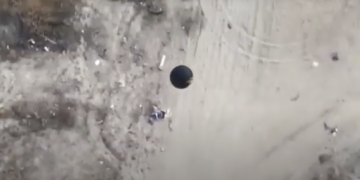Andrey Rublev, the rising star in the world of tennis, made headlines on Wednesday during his match against Carlos Alcaraz in the ATP Finals in Italy. The match took a dramatic turn when Rublev, in a fit of frustration, unleashed a wild temper tantrum that resulted in a bloody knee. The incident, which left him with a gash on his knee that required medical attention, has sparked a conversation about emotional outbursts in professional sports.
Video footage from the court shows the 26-year-old repeatedly smashing his racket into his knee, causing a significant injury. Despite the pain and discomfort, Rublev managed to finish the match, ultimately losing to Alcaraz with a score of 7-5, 6-2.
Following the match, Rublev spoke to reporters and assured them that his knee was okay, but expressed his disappointment, saying, “I get disappointed and couldn’t manage.” The incident has garnered attention both on and off the court, with fans and analysts weighing in on the emotional toll that intense competition can take on athletes.
Social media was also abuzz with reactions to Rublev’s outburst, with one Twitter user expressing concern for the player’s well-being, “Non vraiment calmez Andrey Rublev il va se décapiter sur le court un jour,” which translates to “No really, calm Andrey Rublev, he’s going to decapitate himself on the court one day.”
The ATP Finals is the season-ending event for the ATP Tour, which means that Rublev will have some time to recuperate and regroup before his next competitive matches. This incident raises important questions about the pressure and stress faced by athletes at the highest levels of competition, and how they cope with the mental and emotional demands of their sport.
In the world of professional sports, emotional outbursts are not uncommon, and athletes often find themselves under immense pressure to perform at their peak. However, managing these emotions and channeling them effectively is an essential part of an athlete’s journey to success.
The incident involving Rublev serves as a reminder of the physical and emotional toll that competitive sports can take on athletes, and the importance of mental resilience and emotional well-being in the pursuit of athletic excellence. It also highlights the need for athletes to have access to resources and support systems that can help them navigate the challenges of their profession.
Ultimately, Andrey Rublev’s explosive outburst on the court serves as a powerful reminder of the humanity of athletes and the complex emotions they experience in the pursuit of their passion. As fans and observers, it’s important to remember that behind the impressive displays of athleticism are individuals who face their own struggles and challenges, both on and off the court.
While Rublev’s outburst may have been a moment of intense emotion, it also offers valuable lessons about the complexities of the human experience in the world of sports. As he takes the time to recover from his injury and reflect on the events of the match, Rublev’s journey serves as a powerful example of the resilience and strength required to succeed in the competitive arena of professional sports.
In the end, Andrey Rublev’s fiery outburst and the subsequent aftermath offer a glimpse into the human side of professional sports, and a valuable opportunity to reflect on the emotional and mental challenges faced by athletes in their quest for greatness. It’s a reminder that behind the athletic performances are real people, with their own struggles, triumphs, and moments of vulnerability.































































